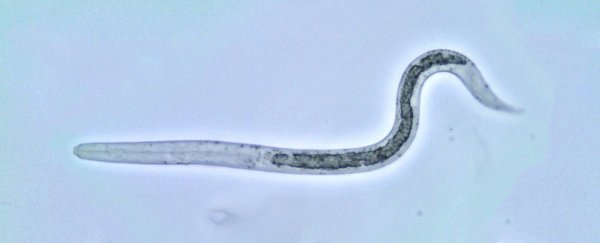After a Chinese woman complained about stomach pains for more than 10 years, doctors performed surgery and found the cause of her pain was a foot-long parasitic worm inside of her intestines, Fox News reported.
Before her surgery, the 41-year-old woman had gone to multiple doctors for her pain, but the worm went undetected until her recent surgery.
"I couldn't believe my eyes," doctor Li Juan, the woman's surgeon, reportedly told AsiaWire. "Her intestines provided the ideal conditions for the parasite to grow, but it was still surprising to see a case in person."
After conducting more tests, Juan found that the woman had ascariasis, a parasitic infection that happens when a person ingests food or water infected with parasitic eggs. According to the Centres for Disease Control and Prevention (CDC), around 1.2 billion people around the world have ascariasis.
Although Juan was unable to pinpoint exactly how the woman became infected, it's likely that she ate produce that wasn't properly cleaned or drank water that contained the parasite eggs, which are small and difficult to see. (Indeed, the woman said she'd consumed unboiled and therefore potentially infected water.)
Then, presumably, the parasitic worm was able to grow inside of her intestines.
The parasite eggs can get into produce or a water supply and spread to other people if human faeces are used to fertilize soil or remain on the ground, according to the CDC website.
It's hard to tell if you have ascariasis
It's rare that a person with ascariasis will show any symptoms, but if they do, stomach pain is one. Additionally, coughing could be a symptom and signals that the parasite is moving through the person's body, according to the CDC.
Since symptoms are rare or mild if a person does have any, doctors diagnose the parasitic infection through a stool sample. Using a microscope, doctors can look for parasitic eggs in the stool that could have caused a person's infection.
Sometimes, it's possible for an infected person to poop or cough the parasite out of their bodies. If you think this has happened, the CDC recommends you take the specimen to your doctor to be examined.
Anthelmintic medications are used to treat people with parasites in their bodies, and take just one to three days to work, according to the CDC.
Most times, parasitic infections don't lead to health issues, but if you have multiple parasites in your body, you can develop an intestinal blockage, severe pain, and vomiting, according to Healthline.
Washing hands and properly cleaning produce can prevent the spread of the parasitic infection
Ascariasis is uncommon in the United States. Still, washing your hands and making sure anything you eat has been thoroughly cleaned (especially foods grown in manure-fertilised soil) can protect against ascariasis and parasitic infections in general, the CDC noted.
This article was originally published by Business Insider.
More from Business Insider:
